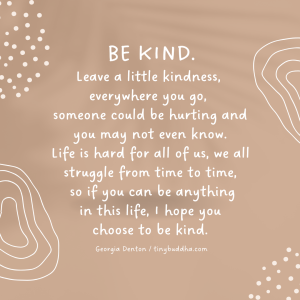
“The present moment is filled with joy and happiness. If you are attentive, you will see it.” ~Thích Nhất Hạnh, Peace is Every Step: The Path of Mindfulness in Everyday Life
Do you ever feel like you’re too busy for meditation?
You understand the benefits, and you’d really like to commit to it. But you’re a busy person. You have deadlines to meet, food to prepare, bills to pay, kids to raise, family members to call—and even that’s barely scratching the surface.
We’ve all been there. I certainly have.
Before I found mindfulness, I struggled with concentration for years. When I moved away from home to make a living as a freelance writer and travel the world, it only got worse.
Suddenly I was the other side of the globe, with no family and often no friends.
I should have been looking forward to the next exciting meal, going out and meeting interesting new people, or just appreciating the sights and sounds of an unfamiliar city. Instead, without the structure that I was accustomed to at home, I was stuck in a perpetual state of work-related anxiety.
As the stress continued to build, I got the uncomfortable feeling that I was squandering the opportunity of a lifetime. I was never fully committed to either work or play, and as I result I wasn’t able to appreciate either.
I knew I had to do something.
So I tried to throw myself into meditation. But I could never keep it up. I’d do two or three days in a row, then I’d skip one, then two, then a week, and suddenly I’d give up.
Then I read about mindfulness. I found that I didn’t need to take a big chunk out of my time out to practice it.
I could be mindful at any time and just fit it into my normal day-to-day activities. A moment here, a moment there, and surprisingly quickly it became a habit. I was calmer, more focused, and my mental health was improving.
And what happened next was a shock.
One morning a few months later I sat down to meditate. I set my alarm for twenty minutes, focused on my breath, and followed through till my alarm buzzed. But it was different. It was a lot easier than I remembered.
It felt normal—natural even. So I did the same the next day, and the next, till I’d gone a month meditating every single day. Small daily mindfulness practices had ended up being a perfect stepping stone to longer meditation sessions.
A few months later a friend of mine was struggling with his work, much in the same way I had. I wanted to see how I could help, so I wrote him an email listing each and every way that I had tried to bring mindfulness into my life. The ideas below are an extension of our conversation.
I hope they make as big a difference to your life as they have done mine.
How to Use These Practices to Cultivate Laser-Sharp Focus
Think of each situation as a trigger to bring you back to the present moment. You definitely don’t have to start with all of them; in fact, I’d start by choosing three or four to practice. Then try adding one a week until you can incorporate all of them into your life.
1. Waking up.
As soon as you wake up, before you get out of bed, take three deep breaths. This will have the double benefit of quietening your mind and giving your brain an oxygen boost to get you out of bed.
2. Getting out of bed.
Not all of us have time for yoga. But we all have time to stretch. When you first stand, take a deep breath in and stretch your hands as high as you can toward the ceiling, fingers pointing straight up. Then as you breathe out, relax, lean forward, and try to touch your toes. Make sure to focus on your breathing and the sensations of the stretch.
3. Making your bed.
Making your bed first thing in the morning is a great opportunity to practice mindfulness. Try to be completely engaged in the activity, putting all your attention into the folding of the sheets.
4. Showering.
As you take a shower, spend a minute or two just feeling the water on your skin; notice the temperature, the pressure, and the sounds as it falls.
5. Getting dressed.
Most of us rush to get our clothes on, but when you get dressed in the morning, take a second to pay attention to the way they feel on your skin, the texture of the material, and the warmth that they provide.
6. Boiling the kettle.
Instead of running around the house and trying to do everything before the kettle boils, sit quietly and listen intently to the water bubble or the kettle whistle.
7. Drinking tea or coffee.
When you drink tea of coffee, sip slowly and be mindful of the taste, temperature, and subtle effect it has on your body.
8. Brushing your teeth.
We all (hopefully) do this. So it’s a great place to start focusing on the present moment.
9. Listen to music.
Listening to some relaxing music before you leave the house in the morning is a great way to center yourself. Completely immerse yourself in the song. Be aware of the volume, cadence, tempo, the uniqueness of the sounds.
10. Writing a to-do list by hand.
Whether you do this first thing in the morning or last thing at night, creating a to-do list can quell anxieties and bring your attention to exactly what you have to do throughout the day. Using an old-fashioned pen and paper will help you be more mindful then will typing it in your phone or computer.
11. Running.
Leave your music at home and just pay attention to the sounds of whatever is around you as you run. You might want to focus on the rhythm of your feet as they hit the ground.
12. Touching your hair.
Next time you catch yourself running your hands through your hair, pay attention how it feels in your hands. Is it soft, spikey, curly, wavy?
13. Stopping at a red light.
A lot of us get angry, nervous or tense when we drive. Every time you stop at a red light, take a deep breath and try to relax any tension you might be holding in your jaw, neck or shoulders.
14. When waiting.
Whenever you find yourself waiting, whether it be for a meeting, at a bus stop, or an appointment, try to relax all the muscles in your face—your jaw, your brows, your eyelids.
15. Walking.
As you’re walking down the street, pay attention to how your legs and feet feel against the ground. Check your breathing. It’s common to breathe shallow when you’re in public, so make sure you’re still breathing through your diaphragm.
16. Hugging or handshakes.
No one likes a cold hug. Make sure the first person you hug or shake hands with today feels like you gave it your complete attention instead of feeling like your mind was somewhere else.
17. Exercising.
At the gym, be completely focused on whatever exercise you are doing. You can let your mind wander when you’re taking a break, but throughout the exercise itself, be focused entirely on the practice.
18. Eating lunch.
At lunchtime, take a bite out of your food and chew it slowly. Be mindful of the texture; is it crunchy or soft? Taste; is it spicy, bitter, sweet, or sour? Temperature; is it hot, cold, or just lukewarm?
19. Talking to someone.
Try to be completely present in conversation, making eye contact and listening to what they say without thinking about what you want to add next or where you’re going to be later.
20. At your desk.
If you work at a desk and catch yourself slouching, take a deep breath, sit up straight, and relax the muscles in your face, your neck, and finally your shoulders.
21. Set a phone alarm.
A lot of people see technology as a hindrance to mindfulness, and that’s true to an extent. But we can use things like phone alarms to remind us to spend a few seconds bringing our awareness back to our breath throughout the day.
22. Follow an insect.
Yep. You may feel like a child, but that’s a good thing—children live in the present. If you see an insect, forget everything else around you and watch how it moves for a few seconds. Be aware that it’s a living being just like you.
23. Getting home at night.
When you walk through the door to your house or apartment, pause and think about how grateful you are to be home. Whether it’s cold outside, and you’ve just walked into warmth, or you’re returning home to someone you love – there’s always something to appreciate.
24. Taking off your shoes.
We all like to take our shoes off after a long day. Pay attention to how your feet feel on the ground, try to move your toes around and feel each one individually.
25. Cooking.
Cooking offers a variety of ways to be mindful. You can hone your attention in on your own movements, the sounds in the kitchen, the taste of the food you are preparing, or the aromas of the different spices as they cook.
26. Watching T.V.
A lot of us work anxiously all day, and when we get some leisure time end up too distracted to truly enjoy it. If you’re watching T.V try to be fully present to what you’re watching, as opposed to half-heartedly talking to a loved one or browsing through your phone.
27. Vacuuming.
Counter-intuitive, I know—this isn’t for everyone. But focusing on the noise of the vacuum can be effective because it often drowns out any other sensory distractions.
28. At dinner.
Think about the ingredients that have gone into your meal—where have they come from? If it’s fish, for example, imagine the fisherman catching it at sea, bringing it to the docks, and selling it to local farmers markets.
29. At least five minutes of Do Nothing Time (DNT).
No checking your phone. No reading a newspaper. Don’t even try to meditate. Just sit there, and if any feelings come up—discomfort, restlessness, or even guilt that you’re not doing anything—just embrace them. Most of the time we’re so wrapped up in doing something ‘productive’ that it’s difficult to just sit still and do nothing.
30. Lying in bed.
Before you go to sleep, take a moment to think of one thing you were grateful for that day, no matter how big or small, or how difficult the day was. This will condition your mind for positivity, and help you sleep better.
As you start to see the benefits of these daily practices, you’ll feel more focused, energized, and you can move on to longer focused meditation sessions. Start taking a few moments out of your day to practice mindfulness now, and you’ll enjoy the rewards for years to come.
Do you have any experience with some of these practices? Let us know in the comments!
About Benjamin Fishel
Ben Fishel is a counsellor and psychotherapist. He has a background in neuroscience, counselling and existential psychotherapy and is on a mission to help people improve their mental health with cognitive science and spirituality. Ben offers a telehealth counseling service worldwide (with the exception of Canada & the U.S.). Don’t forget to follow him on Facebook for more of his essays!













 Though I run this site, it is not mine. It's ours. It's not about me. It's about us. Your stories and your wisdom are just as meaningful as mine.
Though I run this site, it is not mine. It's ours. It's not about me. It's about us. Your stories and your wisdom are just as meaningful as mine. 
Benjamin – I love that you got all thirty of these ideas into one post. I can’t speak loudly enough about how much mindfulness practice can change your life (yes, it’s a practice and never a perfection). It is now studied by Harvard and proven that mindfulness behaviors change the brain for the positive (https://www.washingtonpost.com/news/inspired-life/wp/2015/05/26/harvard-neuroscientist-meditation-not-only-reduces-stress-it-literally-changes-your-brain/). You put thirty down, but everyone doesn’t have to do them all. Do the ones that you like. Just a few will change the way your brain thinks. Mindfulness turned this glass half empty person with terrible self-esteem into a glass half full person with a strong self-esteem. I consider myself living proof that it works.
One of the best articles I have read in recent times. It is a step by step guide on how to incorporate mindfulness in daily life. Living without distraction!
Fabulous tools you gave 🙂 Thank you …. I have one to add : floating in the water ,whether bath or lake/ocean.. I float with ears in water … peaceful = Mindfulness <3
I LOVE that feeling when your ears are underwater!
LOVE this! Thank you so much!
Aire Yoga in the morning gets me THOROUGHLY mindful!
Thank you!…
That’s a great idea Kathy! I used to do that all the time as a kid 🙂
I have been trying to do things that normally really irk me with more mindfulness, like folding laundry or emptying the dishwasher. It’s a pleasure to trade in my usual low level irritation for a few moments of peace 😉
Beautiful, thoughtful post Benjamin.
Thank you for being one of those people who look for solutions for expanding their lives and deepening their experience.
And thank you for sharing. Now I can share this wonderful and simple wisdom.
Hi Kathy,
Glad you enjoyed the post. Floating in the water is a great one to add, probably part of the reason flotation tanks are becoming so successful, thank you!
Thanks for the link! I’m glad mindfulness has been so helpful to you, it’s always a bit of a shock that something so simple can be so life changing.
And you’re right, you don’t have to do all 30, it’s just about doing a little bit every day but being consistent.
Thank you for your kind words Quinn.
And I do think the beauty of this wisdom is in the simplicity 🙂
Thanks for reading!
Yep that’s what it’s all about.
For me it’s crowded places like public transport where everyone seems to walk around with a low level anxiety haha.
Thank you!
I haven’t heard of Aire Yoga but I’m going to check it out.
I’m glad it could help.
Mindfulness is such a foreign experience to most of us that it can seem vague when someone writes about it. I’ve tried to make this as practical as possible!
It’s “just” on the Spanish-language PBS station at 6am.
Thanks, Ben. Your post came at just the right time for me. I have been in a state of overwhelmedness (if I’m allowed to make up words) for the last few months – to the extent of not being able to do anything. I’m going to take your advice and be mindful of the present from time to time. I have no doubt it will help.
check out “mindfulness for dummies” if your interested in an interesting guide for mindfulness, and want to get straight to the point..but the information you guys provide here is unstoppable, love this site, thank you
Hi Benjamin, these tools you have given to use are fantastic and are there for people to use on an everyday basis to get your brain used to being mindful. When you have practised this for a few years like I have (to get through a very traumatic period of my life) , then you find that you can incorporate mindfulness in everything at all times, but, I still get periods where I have to remind myself to do this. Thanks for writing about it and explaining it.
Thank you for this I did enjoy reading it and I do love to read your all your posts however …..Im struggling with this one it feels like a full time job trying to remember to be mindful about everything I’m doing all the time everyday is distracting away from what I am actually doing everyday….?
Maybe I’m trying to hard? I did read the other comments saying you don’t need to do all of them..,, but then if I find myself not being mindful I jump back on it vicious circle maybe for me?
When is it not ok to be mindful?
I just wonder if anyone else has this trouble or maybe some advise?
Thank you
Kirstie
I like this approach to mindfulness! It helps break down the wall that mindfulness and meditation requires sitting in one place for 10-15 minutes a day. Thank you for this article, Ben!